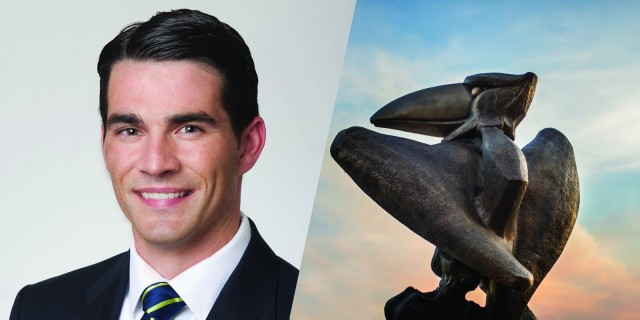Michael Barnicle, Trial Attorney, Duane Morris LLP
Age: 34
KU Degree: BA, Political Science (2004)
Why he’s a Hawk to Watch:
Michael tested his limits and accumulated life-changing experiences as a lawyer in the U.S. Army. Now he works for an international law firm, dealing with government contracts. He’s also committed to community service, offering his services pro bono to military veterans.
 What do you feel is your biggest achievement so far?
What do you feel is your biggest achievement so far?
My biggest professional achievement is my commitment to the military and veterans communities. (My greatest overall achievement is getting the courage to ask my wife out on a date who was, and still is, entirely out of my league.)
My commitment to the military and veteran communities began in 2006 when, as a law student at John Marshall Law School, I co-founded the Veterans Legal Support Center & Clinic that is now one of the largest free veterans legal clinics in the country and really makes a difference in people’s lives.
After law school, I joined the U.S. Army and my first assignment was to Fr. Bragg, N.C., (home of the Airborne and Special Forces) where there were no breaks for the lawyers including 0400 wakeups, long runs, longer marches, jumping out of airplanes, and practicing law in a very high profile, high stress environment. The military was a success because it taught me how to go beyond my personal limits. The military also provided an incredible opportunity to be involved in world events. I supported the missions in Haiti, Afghanistan, and deployed to Iraq where I was on the lead team that shut down the military mission, withdrew U.S. Forces, and transferred all responsibility to the State Department. After Iraq, I was sent to DC to litigate the Army’s largest contracts that included temporary duty in the Kingdom of Saudi Arabia to negotiate with Saudi military.
After the military, I joined the international law firm of Duane Morris in its Chicago and Washington, D.C., offices where I assist clients with government contracts that are vital to national defense and infrastructure. I have litigated more than 90 government contract cases with an estimated value in the billions (most as lead counsel).
I am also still very much committed to pro bono and community service through co-leading a national coalition of law school clinics dedicated to providing free legal services to military veterans as well as providing a variety of institutions assistance when it comes to support for the military and veteran communities.
What’s your lowest career moment and how did you pick yourself up and move on?
My lowest point occurred in law school when I was rejected from an internship the day before I was about to start. It was both embarrassing personally to explain to everyone that I lost the job and extremely stressful because I had no other prospects. I was able to move on because I refused to dwell on the situation, did not feel sorry for myself, and every time I became upset I used that as a reminder/motivation to come up with alternatives. One of those alternatives was applying to the US Army – that has been the best decision I ever made and forever changed my life for the better.
Where do you hope to be in 10 years?
I hope to be running my law firm’s international government contracts practice as well as continuing to serve as an advocate for the military and veteran communities.
What do you know now that you wish you could tell your 18-year-old self?
Employ humor and humility on a daily basis because they both will make you happier. Travel as much as you can because it helps you be more well-rounded. Do not listen to those who say your ideas are unrealistic because they obviously have not figured out the solution. Never accept failure or give up because ideas only become things through hard work and dedication. Also, invest in Apple and, sorry, there are no hoverboards in 2015 but you are never going to believe what phones do.
What’s your best career pro-tip?
When problem solving, the best answers come through simplicity, respect, compassion, and patience. Also, get up earlier than everyone else you know – that way you define how the day starts and people have to catch up to you. Always take your work seriously, never take yourself seriously.
What do you do after you’ve clocked out?
Above anything and everything, I am a family man and there is nothing on earth more important than my wife and our two boys. As such, I spend as much time with my wife and our boys as possible that generally includes family adventures to museums, parks, and having fun being silly (because a day without laughter is a day wasted). Aside from time with my family, currently, I am training for my first triathlon.
What is a fun fact about you that no one knows?
I rarely multitask. I usually only work on one thing at a time until it is complete – that includes looking at email only once or twice a day.
